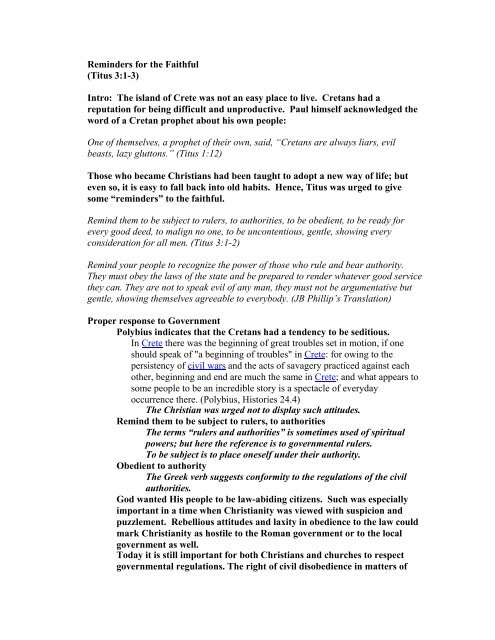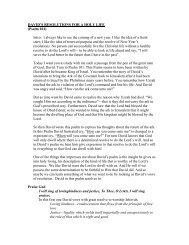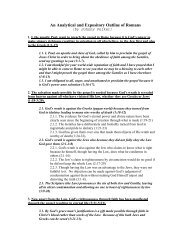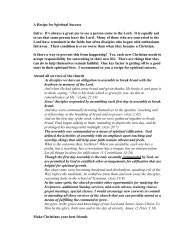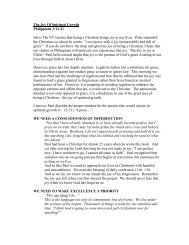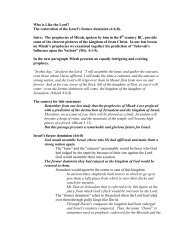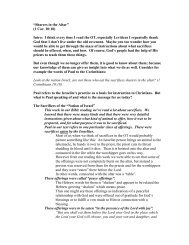Reminders for the Faithful (Titus 3:1-3) Intro: The ... - Truth Chasers
Reminders for the Faithful (Titus 3:1-3) Intro: The ... - Truth Chasers
Reminders for the Faithful (Titus 3:1-3) Intro: The ... - Truth Chasers
You also want an ePaper? Increase the reach of your titles
YUMPU automatically turns print PDFs into web optimized ePapers that Google loves.
<strong>Reminders</strong> <strong>for</strong> <strong>the</strong> <strong>Faithful</strong><br />
(<strong>Titus</strong> 3:1-3)<br />
<strong>Intro</strong>: <strong>The</strong> island of Crete was not an easy place to live. Cretans had a<br />
reputation <strong>for</strong> being difficult and unproductive. Paul himself acknowledged <strong>the</strong><br />
word of a Cretan prophet about his own people:<br />
One of <strong>the</strong>mselves, a prophet of <strong>the</strong>ir own, said, “Cretans are always liars, evil<br />
beasts, lazy gluttons.” (<strong>Titus</strong> 1:12)<br />
Those who became Christians had been taught to adopt a new way of life; but<br />
even so, it is easy to fall back into old habits. Hence, <strong>Titus</strong> was urged to give<br />
some “reminders” to <strong>the</strong> faithful.<br />
Remind <strong>the</strong>m to be subject to rulers, to authorities, to be obedient, to be ready <strong>for</strong><br />
every good deed, to malign no one, to be uncontentious, gentle, showing every<br />
consideration <strong>for</strong> all men. (<strong>Titus</strong> 3:1-2)<br />
Remind your people to recognize <strong>the</strong> power of those who rule and bear authority.<br />
<strong>The</strong>y must obey <strong>the</strong> laws of <strong>the</strong> state and be prepared to render whatever good service<br />
<strong>the</strong>y can. <strong>The</strong>y are not to speak evil of any man, <strong>the</strong>y must not be argumentative but<br />
gentle, showing <strong>the</strong>mselves agreeable to everybody. (JB Phillip’s Translation)<br />
Proper response to Government<br />
Polybius indicates that <strong>the</strong> Cretans had a tendency to be seditious.<br />
In Crete <strong>the</strong>re was <strong>the</strong> beginning of great troubles set in motion, if one<br />
should speak of "a beginning of troubles" in Crete: <strong>for</strong> owing to <strong>the</strong><br />
persistency of civil wars and <strong>the</strong> acts of savagery practiced against each<br />
o<strong>the</strong>r, beginning and end are much <strong>the</strong> same in Crete; and what appears to<br />
some people to be an incredible story is a spectacle of everyday<br />
occurrence <strong>the</strong>re. (Polybius, Histories 24.4)<br />
<strong>The</strong> Christian was urged not to display such attitudes.<br />
Remind <strong>the</strong>m to be subject to rulers, to authorities<br />
<strong>The</strong> terms “rulers and authorities” is sometimes used of spiritual<br />
powers; but here <strong>the</strong> reference is to governmental rulers.<br />
To be subject is to place oneself under <strong>the</strong>ir authority.<br />
Obedient to authority<br />
<strong>The</strong> Greek verb suggests con<strong>for</strong>mity to <strong>the</strong> regulations of <strong>the</strong> civil<br />
authorities.<br />
God wanted His people to be law-abiding citizens. Such was especially<br />
important in a time when Christianity was viewed with suspicion and<br />
puzzlement. Rebellious attitudes and laxity in obedience to <strong>the</strong> law could<br />
mark Christianity as hostile to <strong>the</strong> Roman government or to <strong>the</strong> local<br />
government as well.<br />
Today it is still important <strong>for</strong> both Christians and churches to respect<br />
governmental regulations. <strong>The</strong> right of civil disobedience in matters of
faith should not be used as justification <strong>for</strong> disobedience to laws we<br />
simply don’t like. Governments can surely create hardships on people by<br />
demanding time-consuming paperwork, record keeping, licensing, etc.<br />
<strong>The</strong> Christian must resist <strong>the</strong> tendency to be rebellious and resentful<br />
toward such things; but instead show willing compliance with <strong>the</strong> law of<br />
<strong>the</strong> land, even when being inconvenienced. Our actions and reactions<br />
send a message to o<strong>the</strong>rs.<br />
Proper response to all men<br />
Be ready <strong>for</strong> every good deed<br />
<strong>The</strong> idea includes not only willingness but also <strong>for</strong>ethought<br />
Christians must have a mindset to be a participant in good things,<br />
ra<strong>the</strong>r than a bystander. This is especially true in areas where our<br />
involvement or lack of it may send a message to unbelievers about<br />
our commitment to principles we uphold.<br />
What message do we send when o<strong>the</strong>rs who know our<br />
profession of faith ask us to give to a worthy cause and we<br />
refuse?<br />
What message do we send when o<strong>the</strong>rs are working diligently<br />
to make needed changes in important social areas and we<br />
avoid participation at any level?<br />
Obviously we can’t be everything to everybody; but we should<br />
give careful thought to “how ready” we are to participate in<br />
good deeds <strong>for</strong> o<strong>the</strong>rs.<br />
Malign no one<br />
<strong>The</strong> word translates <strong>the</strong> word from which we get “blaspheme”. We<br />
usually use <strong>the</strong> word to speak of improper words toward God or<br />
spiritual things; but <strong>the</strong> word really means to “speak against”<br />
something. What we might call “bad mouthing” someone!<br />
Though <strong>the</strong>re is much about non-Christians that may be worthy of<br />
criticism, Paul urges Christians to manifest grace and generosity<br />
toward outsiders, perhaps especially to outsiders.<br />
Do we want to be seen as critical and condemning or gracious and<br />
<strong>for</strong>giving? I remember a gentle man who served in <strong>the</strong> postal service<br />
in Lawrenceburg, TN. His name was Teddy Crews. Through <strong>the</strong><br />
years he earned a reputation of kindness toward all people. At his<br />
death, numerous people in <strong>the</strong> community remarked that <strong>the</strong>y had<br />
never heard him say an unkind word to or about anybody!<br />
Be uncontentious, gentle, showing every consideration<br />
<strong>The</strong> first word “amoxos” referred to someone who did not fight in a<br />
battle. Thus, it meant “uncontentious”. <strong>The</strong> same word appears in<br />
<strong>the</strong> qualifications of an elder (“not a brawler”).<br />
In contrast Paul urges disciples to be “epieikeis”, that is, moderate,<br />
reasonable, or <strong>for</strong>bearing..<br />
showing every consideration <strong>for</strong> all men<br />
“to show perfect courtesy to all men” (RSV).
<strong>The</strong> word “prautes” is usually translated “meek” in <strong>the</strong> KJV.<br />
Our word has connotations of weakness; but in actuality this<br />
word suggests a person with great power over <strong>the</strong>ir emotions<br />
enabling <strong>the</strong>m to refrain from angry words or actions toward<br />
o<strong>the</strong>rs. It is <strong>the</strong> ability to remain calm in <strong>the</strong> face of<br />
provocation.<br />
What is impressive is <strong>the</strong> emphasis on totally or<br />
completeness.. Showing “all” consideration to “all” men.<br />
This is especially important in suggesting <strong>the</strong> degree to which<br />
we should make ef<strong>for</strong>t to get along with o<strong>the</strong>rs and at <strong>the</strong><br />
same time, <strong>the</strong> inclusion of even <strong>the</strong> most difficult cases,<br />
including hostile people.<br />
We should all cultivate this kind of courtesy, moderation, and selfcontrol.<br />
Sometimes we may reason that <strong>the</strong> only way to get through<br />
to some people is to be rude to <strong>the</strong>m. God would have us show<br />
strength without ever being ugly to anyone!<br />
I fear in many life situations we may not be much different from<br />
o<strong>the</strong>r people where we ought to be really different. We may feel<br />
justified in “letting someone have it” as a way of getting satisfaction<br />
over a problem in business. Did you ever chew anyone out over <strong>the</strong><br />
phone? Or angrily present yourself to a store clerk about a matter?<br />
We must be careful not to let o<strong>the</strong>rs “push us over <strong>the</strong> edge”.<br />
Conclusion: If our homes give us an opportunity to adorn <strong>the</strong> gospel, so do our day<br />
to day associations with <strong>the</strong> people of this world. This week concentrate on having<br />
an impact on <strong>the</strong> people who see you most often in a social setting. Ask yourself,<br />
“What message am I sending by my attitudes, reactions, and involvement?”<br />
Hopefully, it will be <strong>the</strong> one we’ve talked about tonight!


